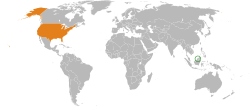Brunei–United States relations
Brunei–United States relations date from the 19th century. On 6 April 1845, USS Constitution visited Brunei. The two countries concluded a Treaty of Peace, Friendship, Commerce and Navigation in 1850, which remains in force today. The United States maintained a consulate in Brunei from 1865 to 1867.
 | |
Brunei |
United States |
|---|---|
| Diplomatic mission | |
| Embassy | Embassy |
| Envoy | |
| Ambassador Dato Serbini Ali | Ambassador Craig B. Allen |
Diplomatic visits
In 2013, President Barack Obama was due to visit Brunei for the ASEAN Summit, however due to shut-down of the United States government, Secretary of State John Kerry replaced Obama.
A few months later, the sultan of Brunei went on a state visit to the United States and met Obama.
History
The United States welcomed Brunei Darussalam's full independence from the United Kingdom on 1 January 1984, and opened an embassy in Bandar Seri Begawan on that date. Brunei opened its embassy in Washington, D.C. in March 1984. Brunei's armed forces engage in joint exercises, training programs, and other military co-operation with the US. A memorandum of understanding on defence co-operation was signed on 29 November 1994. The Sultan of Brunei visited Washington in December 2002.
Principal US Embassy officials
- Ambassador: Craig B. Allen
- Deputy Chief of Mission: Mark S. Dieker
- Political/Economic/Consular Chief: Fausto DeGuzman
- Public Affairs Officer: Edward Findlay
- Management Officer: Shiraz Wahaj
Diplomatic missions
The US Embassy is located in Bandar Seri Begawan. Brunei has an embassy in Washington, D.C.
References
![]()
